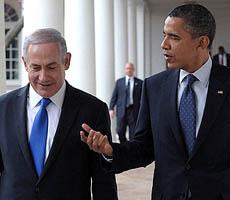Soft words and hard reality
By Wes Pruden
PrudenPolitics.com
Benjamin Netanyahu and Barack Obama are men trapped
in pickles. As the prime minister, Bibi’s first duty
is to assure the survival of Israel. Against the
prospect of another Holocaust, nothing else matters.
Barack Obama’s pickle is a whopper made of his own
bungling, and his stiffing the Israelis is part of
that bungling. Push is just about ready to confront
shove in the Middle East, and particularly in Iran,
which has sworn to destroy the Jewish state, and Mr.
Obama apparently can’t spare a few minutes to talk
to Mr. Netanyahu about it, even after the prime
minister flew to America for the conversation. He
shouldn’t be surprised that evil men in Arabia
watch, and take note of American “resolve.”
His
dilemma over what to do about the assault on
American diplomatic outposts in Egypt and Libya is
related to Mr. Netanyahu’s pickle, though the
president might not understand that. He’s blinded by
his infinite patience with the endless barbarism
that certain followers of Islam continue to inflict
on the rest of the world.
A
high Israeli government official says Mr. Netanyahu
asked to see the president during a 54-hour visit to
the United States, where he will attend a session of
the United Nations to listen to abuse, insult and
vilification from delegates from assorted tribes
with flags who can’t wait to watch somebody else do
something they can’t.
The
White House response to Mr. Netanyahu’s request, or
lack of one, was described by Ha’aretz, the
Jerusalem daily that is the favorite of the Israeli
left, as marking "a new low in relations between
Netanyahu and Obama, underscored by the fact that
this is the first time Netanyahu will visit the
United States as prime minister without meeting with
the president."
Mr.
Netanyahu must tread lightly dealing with this White
House. Ehud Barak, the defense minister, takes
careful note of this reality, saying "we must not
forget that the United States is Israel's most
important source of support in terms of security."
When Mr. Obama's White House burps and spits, he
expects the Israelis to swim. Hence the dilemma:
something must be done soon about Iran, or else
accommodate Tehran as an irresponsible new member of
the nuclear club. Mr. Obama has made it clear that
he is not much interested in Israel's security
problems, though he's willing from time to time,
when under duress, to display rhetorical devotion to
a U.S.-Israel special relationship. He acts as if he
doesn't believe a word of it.
Mr.
Netanyahu must decide whether to deal with Iran's
nuclear program now, before Nov. 6, while President
Obama would be under irresistible political pressure
to go to Israel's aid, or delay a strike on Iran's
nuclear weapon works, gambling that Mitt Romney, an
authentic friend, will be elected president. If he
decides to wait and Mr. Obama is elected to a second
term, Israel must do without a trusted friend in
Washington. Some pickle, and it's not even kosher.
Mr.
Obama promised Vladimir Putin that if he could get a
little space between now and November, he will have
"more flexibility" in U.S.-Russian relations after
his re-election. He didn't tell us exactly what that
means, though his policy has been to "re-set"
relations between the two countries. Once elected,
Mr. Obama would "re-set" relations with Israel, too.
We
got a glimpse this week of the kind of re-setting we
should expect in a second Obama term. "The world
tells Israel to wait, 'there's still time,'" Mr.
Netanyahu said. "And I say, wait for what? Wait
until when? Those in the international community who
refuse to put red lines before Iran don't have a
moral right to place a red light before Israel. If
Iran knows there is no red line, if Iran knows there
is no deadline, what will it do? Exactly what it's
doing."
As if
on cue, a spokeswoman for the U.S. State Department
stepped up with the usual girly-girl stuff: "We
don’t think it's particularly useful to have these
conversations in public. It doesn't help the process
and it doesn't help the integrity of the diplomacy."
A similar girly-girly message of sympathy for the
mob led to horror, tragedy and humiliation in Libya.

Diplomacy is nice, and keeps the wet, the wilted and
the wimpy of Foggy Bottom off the street. Sometimes
diplomacy works, but never when it's backed by
appeasement, apology and high-minded argle-bargle.
We're getting a demonstration in Egypt, Yemen and
Libya of what happens when a president speaks softly
and carries an apology and a wet noodle. He
eventually sounds like Alfred E. Neuman, the famous
world leader from Mad comics: "What? Me worry?"
Wesley Pruden is editor emeritus of The Washington
Times.

